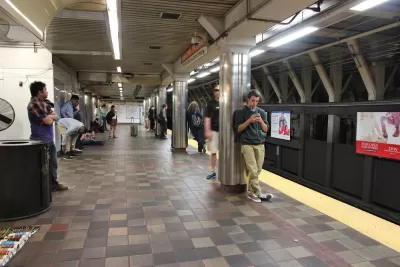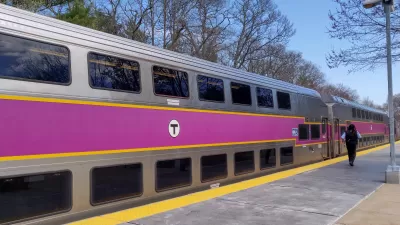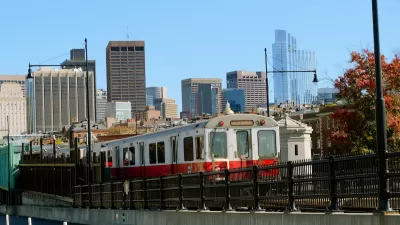Public transit agencies are responding to declining ridership during the Coronavirus outbreak by reducing service. But the right balance between safe, reliable, and sustainable will be hard to calibrate in these difficult times.

Adam Vaccaro reports: “With ridership drastically reduced due to the coronavirus outbreak, the MBTA is planning changes to service starting Tuesday, according to an internal memo sent to agency staff.”
“The memo from T general manager Steve Poftak did not describe the changes, but said they will be ‘based in part on ridership patterns and guidance provided by state public health officials,” according to Vaccaro.
The Washington Metropolitan Transit Authority recently reduced rush hour frequencies after ridership fell as a result of coronavirus concerns. As Vacarro notes, transit agencies will be challenged to find a balance of service, serving those who still require transit while ensuring trains don’t overcrowd and require too much physical proximity by riders:
Transit advocates on Sunday said it would be reasonable for the MBTA to reduce some service under the circumstances, but that the T must balance keeping service available for riders who work or must otherwise reach essential locations, such as grocery stores and healthcare facilities.
The T must also keep enough service to limit crowding on trains or buses that would more easily allow the virus to spread, they said. That could require targeted changes, route by route, especially on buses, advocates suggested.
In the San Francisco Bay Area, BART is posting daily updates ridership updates as coronavirus shuts down businesses and events around that region. The decision to post daily ridership updates was defended by the agency on Twitter thusly:
Communicating data is important.
It shows:
People are staying home if they can
There are people who must report to work and the role we play getting them there
There is no crowding, so riders can be reassured there is social distancing
It’s better than saying nothing https://t.co/mK0Jj2v2Iz— SFBART (@SFBART) March 16, 2020
In Seattle, Sound Transit and King County Metro have said they will temporarily suspend fare enforcement actions," according to an article by Mischa Wanek-Libman.
[Update: Public transit in Cedar Rapids is now free, although the reporting does imply that service could eventually be suspended" "City of Cedar Rapids Transit is continuing service as of Monday, March 16. To limit interactions, fares won’t be collected."
FULL STORY: MBTA planning service changes in response to coronavirus, memo says

Maui's Vacation Rental Debate Turns Ugly
Verbal attacks, misinformation campaigns and fistfights plague a high-stakes debate to convert thousands of vacation rentals into long-term housing.

Planetizen Federal Action Tracker
A weekly monitor of how Trump’s orders and actions are impacting planners and planning in America.

San Francisco Suspends Traffic Calming Amidst Record Deaths
Citing “a challenging fiscal landscape,” the city will cease the program on the heels of 42 traffic deaths, including 24 pedestrians.

Defunct Pittsburgh Power Plant to Become Residential Tower
A decommissioned steam heat plant will be redeveloped into almost 100 affordable housing units.

Trump Prompts Restructuring of Transportation Research Board in “Unprecedented Overreach”
The TRB has eliminated more than half of its committees including those focused on climate, equity, and cities.

Amtrak Rolls Out New Orleans to Alabama “Mardi Gras” Train
The new service will operate morning and evening departures between Mobile and New Orleans.
Urban Design for Planners 1: Software Tools
This six-course series explores essential urban design concepts using open source software and equips planners with the tools they need to participate fully in the urban design process.
Planning for Universal Design
Learn the tools for implementing Universal Design in planning regulations.
Heyer Gruel & Associates PA
JM Goldson LLC
Custer County Colorado
City of Camden Redevelopment Agency
City of Astoria
Transportation Research & Education Center (TREC) at Portland State University
Jefferson Parish Government
Camden Redevelopment Agency
City of Claremont





























